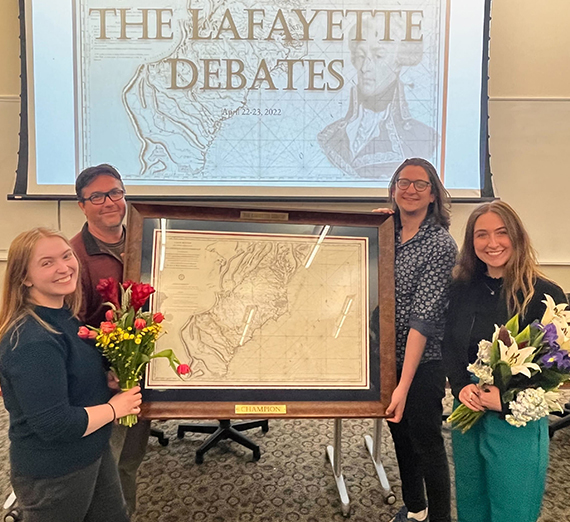Students Win Lafayette Debates, Present to U.N. Official

Victorious duo also take first, third place as top speakers at invitation-only event
SPOKANE, Wash. – As a result of their recent victory in the prestigious Lafayette Debates in Washington, D.C., two Gonzaga University debaters on Friday presented their research on the United Nations’ New Urban Agenda to the top U.N. official in charge of implementing it.
Gonzaga’s Molly Martin and Avalyn Renee engaged virtually with Michal Mlynár, Slovakia’s ambassador and permanent representative to the U.N., who is president of the 25th session of the U.N. Habitat Governing Council.
“I am so lucky to have gotten to finish off my debate career on such a strong note and I think it definitely shows a lot of hard work on behalf of the whole team,” said Martin, a communication studies major from Sacramento, California. “I couldn't be more grateful.”
Renee, of Boise, Idaho, echoed that feeling and referenced the judges for the final rounds.
“Being able to debate in finals with experts in the topic area as judges was super humbling – it made me feel as though our discussions were influential and important,” she said. “I am really grateful to have won this tournament with Molly,” who has been her debate partner the past three years.
In addition to winning the tournament, the pair nearly swept top individual honors. Renee, an Honors Program student majoring in philosophy, was named top overall speaker and Martin was third.
They defeated Claremont Colleges in the final round on a unanimous decision April 23 to win the invitation-only event.
“It was a great weekend and fantastic way to put an exclamation point on our season,” said Glen Frappier, GU’s director of forensics who is a senior lecturer in communication studies.
This year’s Lafayette Debates topic challenged students from 13 schools in the United States and France to assess whether the New Urban Agenda is a desirable global blueprint for urban development. Martin and Renee offered their academic perspective to Mlynár, in New York, based on the arguments they developed for the competition, as well as those of their competitors.
Annmarie Caño, dean of the College of Arts and Sciences, lauded the students’ success.
“The Gonzaga debate team has taken our Jesuit education principle of ‘cura personalis’ or ‘care for the whole person’ to a whole new level,” Caño said. “Molly and Avalyn, and their coaches and fellow debaters, not only show care and respect on the debate circuit but also demonstrate how a Jesuit liberal arts education prepares students for the real world by building skills in research, critique, public speaking, and a focus on creating a better world.”The map of colonial America – “Carte Réduite Des Côtes Orientales De L'Amérique (1778)" – symbolizes the longstanding relationship between the U.S. and France. It was issued for use by the French navy and merchant marine and locates the city of “York,” also known as Yorktown, which soon after the map was issued was the scene of the French naval blockade that was the immediate cause of the surrender of Cornwallis and the end of the Revolution.
According to organizers, the Lafayette Debates’ nearly 200-year history highlights the two countries’ shared intellectual traditions of political dissent and democratic debate.
During Gen. Lafayette's 1824 “hero’s tour” of the United States celebrating his role and the role of France in the American Revolutionary War, Lafayette and his son George Washington Lafayette were received by the debate and literary society of Columbian College, later renamed The George Washington University. G.W. Lafayette took the floor for a debate with society members. Afterward, the two Lafayettes accepted honorary membership into the society and the occasion was commemorated by a debate series entitled “The Lafayette Debates” in their honor.
In 2013, the embassies of France and Germany and The George Washington University collaborated to create a civic debate event, The Elysee Treaty Debates. The event was a success and the French Embassy and The George Washington University resolved to build on this success by reviving The Lafayette Debates as an international platform for student dialogue and debate in the belief that, more than ever, a vigorous and respectful trans-Atlantic dialogue is of importance not only to the citizens of the French Republic and the United States, but also the world.
